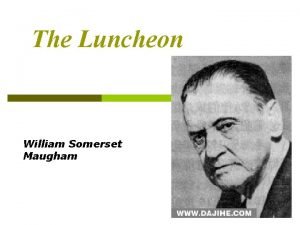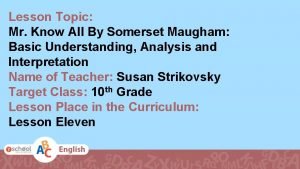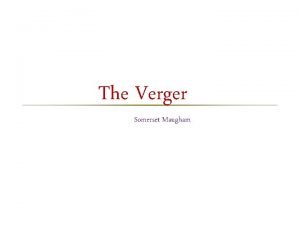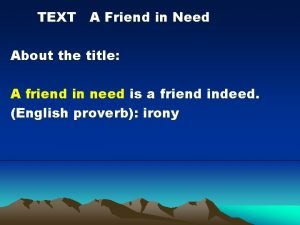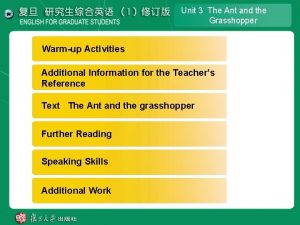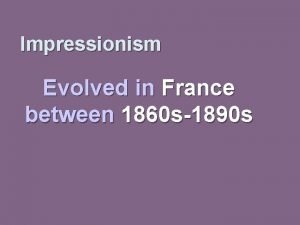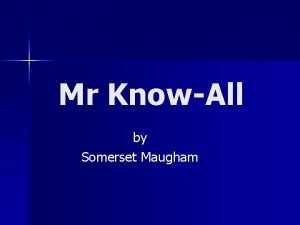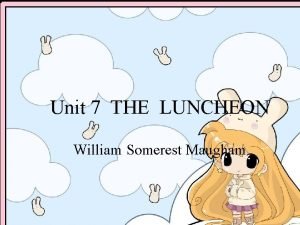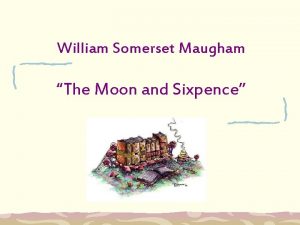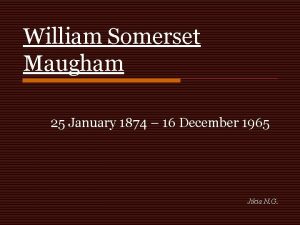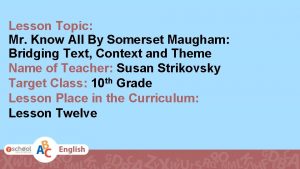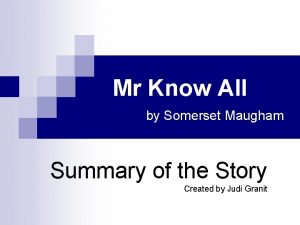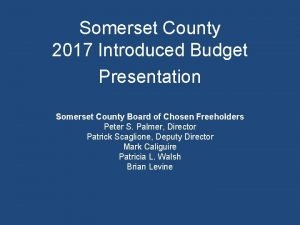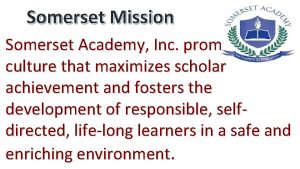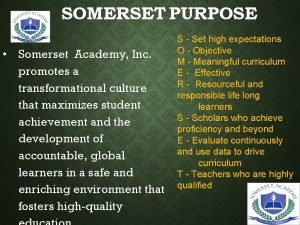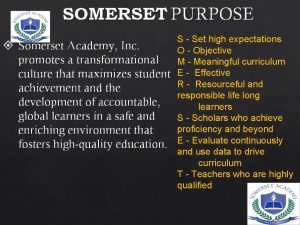The Luncheon William Somerset Maugham William Somerset Maugham

































- Slides: 33

The Luncheon William Somerset Maugham

William Somerset Maugham from Britain novelist, playwright, shortstory writer, highest paid author in the world in the 1930 s.

Notable Works p His reputation as a novelist rests primarily on these books:

His Writing Style mianly about family, love and the twists in marriage. p describe the situations and customs in the upper class. p express the doubts about the society morality. more satiric than humourous. p He always hold calm, impersomal aloof even particular attitudes with some satire and mercy to observe life in almost all his works. p

The Luncheon

Retelling the Story by Talking About the Pictures

Retelling the Story by Talking About the Pictures

Summary of the Story p p p p About a young writer having lunch with a lady. It happened 20 years ago when he was living in Paris as a young writer. The lady whom he had known through correspondence asked him in letter if he could give her a little luncheon at Foyot’s --an expensive restaurant when she was passing through Paris. Her letter flattered writer. Though he was quite poor then, he answered that he would meet her at the restaurant. When the menu was brought to him, he was greatly startled to find that the prices were much higher than he had anticipated. But his friend set his mind at rest by saying that she never ate much for lunch. Repeatedly saying that, she ate one expensive dish after another. The lunch had cost writer all the money and left him penniless for the whole month. But he had my revenge at last. When he met her recently at a theatre, he found that woman had become much too fat.

Introduction to the Story This is a well-known short story by Maugham, in which he describes an impoverished young writer who had to invite a lady to lunch. The latter said repeatedly that she preferred simple and light meals but turned out to have a very good appetite, especially for expensive things. The young writer felt he was caught in a trap of his own making because he was inexperienced and he was susceptible to flattery.

Introduction to the Story But the realization came too late. The irony of the situation, the rich understatement of the dialogue and the humorous narrative combine to make the story entertaining.

Characteristics of the Story a typical short story of Maugham: p it gradually and systematically builds up to a climax, and finally come to a dramatic ending. p the tone of the story: Ironic / sarcastic/satiric , humorous, and rich understatement (克制的陈述). Simple, clear, straightforward and fluent. p

The Author--- a stupid young writer p p p The author is young, naïve, polite, generous, honest, kind, but inexperienced --- green in judgment about the worldly affairs. He was not rich, lived frugally, and had never even thought of visiting that restaurant, nor did he possess the art of refusing her request. At the luncheon he had ordered for the cheapest dish muttonchops.

The Woman p p a middle-aged woman of hypocrisy and greed. The woman is mean, rude, greedy, insincere, selfish, crafty, extravagant and sophisticated. talkative she is a high-society snob

The Woman Constantly she repeats “I never eat more than one thing”, while at the same time, she ordered for Salmon, and Caviar, and asparagus --- the horribly expensive dish. p After the meal, she had ordered for white champagne, ice-cream and then coffee, all the same announcing that 'she never ate anything for luncheon - just a bite'. p She picked up one peach protesting that her meal was just a snack, and that she could certainly enjoy the Peach. p

The Woman p p The food she orders symbolize status, and goes on to display waste, greed, and extravagance. Her repetition of “I never eat more than one thing” emphasizes the conflict between what she says and what she actually does. This contrast between what she says she believes in and what she actually does makes the reader gradually find out that she is not at all truthful to her principles. By using the language this way, the writer gradually discloses the true character of the woman.

The Waiter --- a seasoned waiter p p p He is mercenary. 唯利是图. His smile is broad笑容可掬, 甚至笑得嘴角都扯到耳朵那去 了 and ingratiating奉承的. He had a priestlike face长着 一张牧师般和善的脸. In the surface, the servant was kind and provided good service. Actually his only purpose is to attract the woman to order more expensive things. The more expensive, the better.

The Setting of the Story The appropriate setting powerfully displays societal differences. p The 1 st location, theatre, reflects the narrator’s opinion that life resembles a stage performance and people generally adapt their behaviour according to their surroundings and audience, using words that are often not theirs. p Foyot’s --an expensive restaurant, forms a striking contrast with the author’s financial situation. p

10 Rhetorical Features rhetorical question(修辞性疑问/修辞反问句) p contrast(对照) p parallelism(平行) p understatement(低调/含蓄陈述) p irony(反语) p transferred epithet(移就) p antithesis(平行对照) p metaphor(隐喻) p innuendo(暗指/影射) p climax(层递) p

1. Rhetorical Question(修辞性疑问/修 辞反问句) is asked in order to make a point and without the expectation of a reply. p posed for the sake of encouraging its listener to consider a message or viewpoint. p Amusing, humorous, comedic effect p “Did I remember? ” 我能不记得吗? p persuade an audience to believe in the position(s) of the speaker身临其境. p

2. Contrast(对照) I had a tiny apartment in the Latin Quarter overlooking a cemetery. p I answered that I would meet my friend—by correspondence—at Foyot’s on Thursday at half past twelve. p “I never eat anything for luncheon, ” She said. “Unless you have a little caviar. I never mind caviar. ” p She ate the caviar and she ate the salmon. She talked gaily of art and literature and music. But I wondered how much the bill would come to. ” p

2. Contrast(对照) This contrast between what she says she believes in and what she actually does makes the reader gradually find out that she is not at all truthful to her principles. p Reveal the greedy woman, embody complex inner world of the writer. p The woman keeps enjoying the meal, and chatting about art, literature, and music, p while William kept wondering about the bill. The bill of fare was soaring above that which he had anticipated. William's heart sank, his mouth watered, and yet he had to quell减轻 his emotions. p

3. Parallelism(平行) p p p ___…she ate the caviar and she ate the salmon. ___…she talked gaily of art and literature and music. ___…he assured that they had some so large, so splendid, so tender, that it was a marvel. ___…they were enormous, juicy, and appetizing. I never eat anything for luncheon———I never eat more than one thing———I never drink anything for luncheon———I never want more than that———I couldn’t possibly eat anything more unless…———I don’t eat luncheon———I never eat more than one thing for luncheon. reveal the woman’s hypocrisy and greed.

4. Understatement(低调/含蓄陈述) a form of speech which contains an expression of less strength than what would be expected. p Understatement is a staple of humour in English -speaking cultures, especially in British humour p “We’re none of us getting any younger. ” p She was not so young as I expected and in an appearance imposing rather than attractive p I was earning barely enough money to keep body and soul together. p

4. Understatement(低调/含蓄陈述) The use of down-toners 低调的词语 p rather, quite, almost, a bit, a little, some, sort/kind of scarcely, hardly, pretty p I fancy I turned a trifle pale. p

5. Irony(反语) is a disparity of expression and intention: when a speaker says one thing but means another, or when a literal meaning is contrary to its intended effect. p “You see, you’ve filled your stomach with a lot of meat”———my miserable little chop ———“and I’ve just had a snack and I shall enjoy a peach. ” p

6. Transferred Epithet(移就) p “You’ve filled your stomach with a lot of meat”———my miserable little chop…

7. Antithesis(平行对照) demands for a same or similar structure. p But when I walked out of the restaurant I had the whole month before me and (had) not a penny in my pocket. p

8. Metaphor(隐喻) p Then a terrible thing happened. While we were waiting for the coffee the headwaiter, with an ingratiating smile on his false face, came up to us bearing a large basket full of huge peaches. They had the blush of an innocent girl they had the rich tone of an Italian landscape. 红得酷 似天真少女的脸蛋, 其色调之瑰丽犹如一幅意大利 风景画

9. Innuendo(暗指/影射) An indirect, oblique or subtle derogatory implication in expression, usually derogatory in nature. p “…she gave me the impression of p Having more teeth, white and large and even, than were necessary for any practical purpose. ” p the description of her big, even teeth is a suspense, sets the stage for her greedy eating, intensifies the humorous effect. p

10. Climax(层递) is a figure of speech in which a number of phrases or sentences are arranged in ascending order of rhetorical forcefulness. p Salmon: generously. p Caviare: heart sinking a little p Champagne: hospitable still but not exactly effusive, turned a trifle pale. p Asparagus: heart sinking, I tried with all my might to will him to say no. Panic seized me. ---climax p Coffee & ice-cream: past caring, ask faintly p Peach: terrible thing p

10. climax(层递) p p p The change of the author’s attitude to the woman: my friend ---- my guest--- madam --- the wicked woman have a chat——have a little luncheon——horribly expensive. generously——not exactly effusive——wicked woman——had my revenge The change of the author’s mood startled——sank a little——turned a trifle pale—— sank—— Panic——past caring——faintly

Conclusion p p p The echo of the beginning and ending strengthens the humorous effect: the beginning: If someone had not mentioned her name I hardly think I would have recognized her. At the end of story, the author told us that she weighs 21 stones. So I could not recognize her.

Conclusion Luncheon is one of his masterpieces. p Each character is a social stereotype and their polarity serves to emphasize the gaps in society and Maugham’s theme. p
 William somerset maugham luncheon
William somerset maugham luncheon Number these sentences in the correct order
Number these sentences in the correct order Mr know all text
Mr know all text Somerset maugham symbol
Somerset maugham symbol Vergern
Vergern Text a friend in need
Text a friend in need After realizing his own mistake the grasshopper felt
After realizing his own mistake the grasshopper felt Impressionism characteristics
Impressionism characteristics Luncheon of the boating party analysis
Luncheon of the boating party analysis Từ ngữ thể hiện lòng nhân hậu
Từ ngữ thể hiện lòng nhân hậu Diễn thế sinh thái là
Diễn thế sinh thái là Tư thế worms-breton
Tư thế worms-breton Vẽ hình chiếu vuông góc của vật thể sau
Vẽ hình chiếu vuông góc của vật thể sau Thế nào là giọng cùng tên? *
Thế nào là giọng cùng tên? * 101012 bằng
101012 bằng Hát lên người ơi
Hát lên người ơi Lời thề hippocrates
Lời thề hippocrates Hươu thường đẻ mỗi lứa mấy con
Hươu thường đẻ mỗi lứa mấy con đại từ thay thế
đại từ thay thế Quá trình desamine hóa có thể tạo ra
Quá trình desamine hóa có thể tạo ra Bổ thể
Bổ thể Công của trọng lực
Công của trọng lực Thế nào là mạng điện lắp đặt kiểu nổi
Thế nào là mạng điện lắp đặt kiểu nổi Dạng đột biến một nhiễm là
Dạng đột biến một nhiễm là Vẽ hình chiếu đứng bằng cạnh của vật thể
Vẽ hình chiếu đứng bằng cạnh của vật thể Phản ứng thế ankan
Phản ứng thế ankan Môn thể thao bắt đầu bằng chữ f
Môn thể thao bắt đầu bằng chữ f Thiếu nhi thế giới liên hoan
Thiếu nhi thế giới liên hoan Sự nuôi và dạy con của hươu
Sự nuôi và dạy con của hươu điện thế nghỉ
điện thế nghỉ Một số thể thơ truyền thống
Một số thể thơ truyền thống Nguyên nhân của sự mỏi cơ sinh 8
Nguyên nhân của sự mỏi cơ sinh 8 Tỉ lệ cơ thể trẻ em
Tỉ lệ cơ thể trẻ em Trời xanh đây là của chúng ta thể thơ
Trời xanh đây là của chúng ta thể thơ
